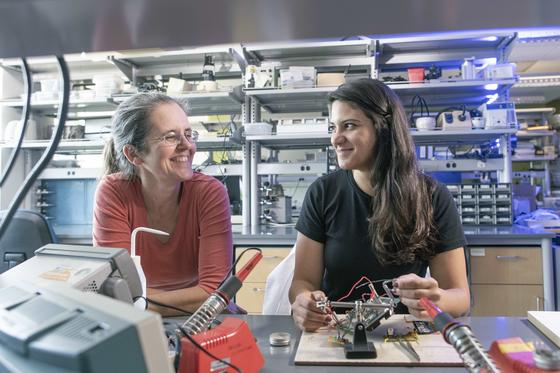Neurotechnology and Computational Neuroscience investigate the most complex machine in the universe: the human brain.
Faculty:
Giorgio Ascoli, Distinguished University Professor
Holger Dannenberg, Assistant Professor
Nathalia Peixoto, Associate Professor
We strive to understand the function of the nervous system across multiple scales, from molecular interactions through individual neurons to large-scale neural circuits with real-world applications to neurological and psychiatric diseases, as well as next-generation artificial intelligence algorithms.
Our areas of expertise include:
Neuroinformatics and computational neuroanatomy
The human brain is a network of one hundred billion tree-shaped cells communicating through one thousand trillion connections. The dynamic activity in this circuit gives rise to thoughts and emotions; its plasticity allows us to learn throughout a lifetime; and its complex architecture stores our memories and personality. Research in this area focuses on developing technologies and models to investigate neural circuits from molecular to whole brain scales. Principal investigator: Giorgio Ascoli.
The Spatial Cognition Lab
The ultimate goal of the lab is to understand neural mechanisms of spatial memory and navigation that are often impaired in various neurological disorders. The multi-disciplinary research on brain mechanisms combines the expertise of biologists, electrical engineers, life scientists, physicists, and computer scientists. The lab records neurons in the brain’s spatial cognition and memory system, including grid cells in the medial entorhinal cortex, and investigates the functions and mechanisms of network rhythms as well as cholinergic neuromodulation in the context of memory-guided navigation. Visit dannenberglab.org to learn more about this research or to connect with the lab. Principal investigator: Holger Dannenberg.

Neural interfaces
This team investigates neural interfaces from the cellular level, for example designing novel sensors that can track electrical activity and neurotransmitters in the brain (in culture and in vivo), as well as designing methods to non-invasively modulate neural activity. A second thrust of the lab is on assistive technology: we are interested in designing devices and systems to help people with disabilities. This entails the design of novel robots and wearable sensors and actuators. Principal investigator: Nathalia Peixoto.

